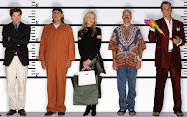
1. The Lives of Others (2007)***
“I think that this is the best movie I ever saw,” said William F. Buckley Jr. upon leaving the theater (according to his column on the film). The tale, set in East Germany in 1984, is one part romantic drama, one part political thriller. It chronicles life under a totalitarian regime as the Stasi secretly monitors the activities of a playwright who is suspected of harboring doubts about Communism. Critics showered the movie with praise and it won an Oscar for best foreign-language film (it’s in German). More Buckley: “The tension mounts to heart-stopping pitch and I felt the impulse to rush out into the street and drag passersby in to watch the story unfold.” — John J. Miller4. Forrest Gump (1994)***
It won an Oscar for best picture — beating Pulp Fiction, a movie that’s far more expressive of Hollywood’s worldview. Tom Hanks plays the title character, an amiable dunce who is far too smart to embrace the lethal values of the 1960s. The love of his life, wonderfully played by Robin Wright Penn, chooses a different path; she becomes a drug-addled hippie, with disastrous results. Forrest’s IQ may be room temperature, but he serves as an unexpected font of wisdom. Put ’em on a Whitman’s Sampler, but Mama Gump’s famous words about life’s being like a box of chocolates ring true. — Charlotte Hays

5. 300 (2007)
During the Bush years, Hollywood neglected the heroism of American soldiers in Iraq and Afghanistan — but it did release this action film about martial honor, unflinching courage, and the oft-ignored truth that freedom isn’t free. Beneath a layer of egregious non-history — including goblin-like creatures that belong in a fantasy epic — is a stylized story about the ancient battle of Thermopylae and the Spartan defense of the West’s fledgling institutions. It contrasts a small band of Spartans, motivated by their convictions and a commitment to the law, with a Persian horde that is driven forward by whips. In the words recorded by the real-life Herodotus: “Law is their master, which they fear more than your men[, Xerxes,] fear you.” — Michael Poliakoff6. Groundhog Day (1993)***
This putatively wacky comedy about Bill Murray as an obnoxious weatherman cursed to relive the same day over and over in a small Pennsylvania town, perhaps for eternity, is in fact a sophisticated commentary on the good and true. Theologians and philosophers across the ideological spectrum have embraced it. For the conservative, the moral of the tale is that redemption and meaning are derived not from indulging your “authentic” instincts and drives, but from striving to live up to external and timeless ideals. Murray begins the film as an irony-soaked narcissist, contemptuous of beauty, art, and commitment. His journey of self-discovery leads him to understand that the fads of modernity are no substitute for the permanent things. — Jonah Goldberg

20. Gattaca (1997)
In this science-fiction drama, Vincent (Ethan Hawke) can’t become an astronaut because he’s genetically unenhanced. So he purchases the identity of a disabled athlete (Jude Law), with calamitous results. The movie is a cautionary tale about the progressive fantasy of a eugenically correct world — the road to which is paved by the abortion of Down babies, research into human cloning, and “transhumanist” dreams of fabricating a “post-human species.” Biotechnology is a force for good, but without adherence to the ideal of universal human equality, it opens the door to the soft tyranny of Gattaca and, ultimately, the dystopian nightmare of Brave New World. — Wesley J. Smith24. Team America: World Police (2004)
This marionette movie from South Park creators Trey Parker and Matt Stone is hard to categorize as conservative. It’s amazingly vulgar and depicts Americans as wildly overzealous in fighting terror. Yet the film’s utter disgust with air-headed, left-wing celebrity activism remains unmatched in popular culture. As the heroes move to stop a WMD apocalypse, they clash with Alec Baldwin, Tim Robbins, Susan Sarandon, Sean Penn, and a host of others, whom they take out with gunfire, sword, and martial arts before saving the day. The movie, like South Park itself, reveals Parker and Stone as the two-headed George Grosz of American satire. — Brian C. Anderson








.jpg)









.jpg)

